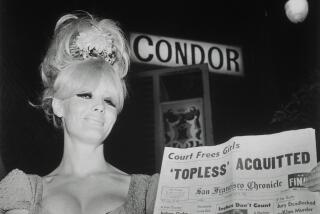From the Archives: Films’ Paulette Goddard; Was Saucy Star of 1930s and ‘40s
Paulette Goddard, the gamin star of more than 40 films of the 1930s and ‘40s, died Monday at her home in southern Switzerland.
Probably best known for her appearances opposite Charlie Chaplin in “Modern Times” and “The Great Dictator,” she was believed to be 84 but reports of her age varied by as much as 15 years.
“Any woman who would tell her age would tell anything,” she said as long ago as 1936.
The cause of death has not yet been determined, said Pia DellaMora, a municipal employee in Ronco, Switzerland, where the actress had her villa. A household member told the Associated Press that Miss Goddard had been ill briefly but offered no specifics.
Her husbands included a wealthy lumber industrialist, and actors Chaplin (although their secretive, puzzling 1936 marriage in China was revealed only at their 1942 divorce hearing in Mexico) and Burgess Meredith. Her last marriage was to novelist Erich Maria Remarque who died in 1970.
She had lived almost exclusively in Europe in luxurious retirement since her 1958 marriage to Remarque, author of “All Quiet on the Western Front,” returning only occasionally to the United States for a small TV role in the 1970s and to promote her husband’s last novel, “Shadows in Paradise,” published after his death.
Born Marion Levee in Whitestone, N.Y., she began her career in a Florenz Ziegfeld revue because her uncle prevailed on his friend Ziegfeld to try her in a small role in “Rio Rita.”
She married industrialist Edgar James while supposedly still in her teens but went to Reno in 1931 to divorce him, and continued West to Hollywood where she was cast as a Goldwyn Girl in “The Kid From Spain.”
Unlike most film stars of the day, Miss Goddard was tanned and athletic--addicted to tennis and long walks. She was viewed by her fans as saucy and mischievous but by Hollywood executives as a hard-boiled business woman who carefully invested her film earnings.
In 1940, her father sued her, complaining the $300 a month support she gave him was inadequate. In his suit, he claimed she had $5,000 a week to spend on “whims.”
Miss Goddard responded that it was because he had failed to keep up the $10 weekly alimony awarded her mother after her parents’ divorce that she was forced to go to work at such an early age.
She developed a penchant for expensive gems (most of them gifts from the men in her life) which she supposedly kept in an old cigar box. In 1947, she insured her diamonds, emeralds and rubies for $500,000, an extraordinary figure for that time.
(Some of her jewels, including a necklace with 50 diamonds, are being sold this week by Sotheby’s, said a spokeswoman for the New York City auction house. In 1979, she sold for $3.1 million her collection of 30 Cezanne, Renoir and Monet paintings.)
Over the years Miss Goddard appeared in such movies as Cecil B. De Mille’s “North West Mounted Police,” in which she played a tempestuous half-breed siren, and in his “Unconquered,” in which she bathed in a barrel.
She also starred in “The Women,” “Hold Back the Dawn,” “Reap the Wild Wind,” “Star Spangled Rhythm,” “So Proudly We Hail!” “Kitty,” “Duffy’s Tavern,” “Diary of a Chambermaid” and “Suddenly It’s Spring.”
She was reported to be a leading candidate for the role of Scarlett O’Hara in “Gone With the Wind” but the part eventually went to Vivien Leigh.
Her last screen role was as Claudia Cardinale’s mother in the 1964 Italian film “Time of Indifference.”
From the Archives: Movie Great Ginger Rogers Dies at 83
From the Archives: The Master of the One-Liner
From the Archives: Bette Davis Dies in Paris at 81
From the Archives: Gloria Swanson, Queen of Movies’ Golden Years, Dies
From the Archives: James Cagney, Legend of Movies, Dies at 86
More to Read
Start your day right
Sign up for Essential California for the L.A. Times biggest news, features and recommendations in your inbox six days a week.
You may occasionally receive promotional content from the Los Angeles Times.






